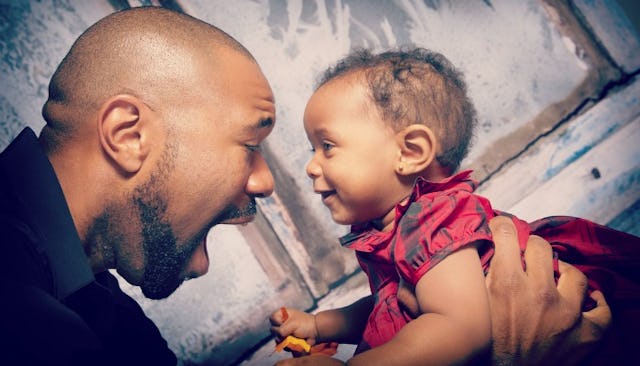My Husband Is Not A Babysitter, He's A Parent

MelvinDyson / Shutterstock
I am headed out of town to attend a conference for four days. I will miss my girls and my husband. My 4-year old is in a clingy phase. Recently, I left for an early meeting before she awoke, and she threw an hour-long tantrum. The girls are used to having both of us around, and it will be tough for my husband because it is generally tough to be on your own with children, covering every little everything for several days in a row.
But I will be back on Friday.
More than once, though, someone has asked how my husband will manage, if he needs help, if I am worried.
I don’t worry about my husband.
When my oldest was in her earliest days of infancy, my husband took her to his parents’ house by himself—his very first daddy-daughter road trip. I was breastfeeding, and it was the first time she and I were apart. We had introduced a bottle to our little one, though, so he packed up a cooler and took off for the day. I can’t remember why I didn’t go with him—I probably needed the time for a grad school deadline (or to sleep). Either way, it was the first time he took her alone and his parents were really impressed.
After their visit, my mother-in-law called me to tell me how amazing I was to allow him to take her on his own. She told me that I was making him into a great father. Although I can’t remember exactly how I responded to her, I am sure that I insisted that he was a great father because of himself and not because of me. I am sure I was thinking, “Why do we assume I’m the one who made him this way?” I remember distinctly replying later in the conversation, “Why does everyone assume I’m the natural?”
This exchange has repeated itself in various iterations in the last six years—most recently this week in preparation for my trip—comments about parenting, the children and the role of the mother and the father. Our household may have a gendered division of labor when it comes to many things: I cook, he takes out the trash. But when it comes to our children, it’s as equally shared as we can have it.
Equally shared parenting was a conscious choice, a concept we read about several years ago. It resonated with both of us. We knew that I would have to gestate the baby and feed it in its earliest days, but beyond those technicalities, we were both in this game together.
Yet, somehow even several years into our family, when our children are not in their usual care arrangement, when the girls are with their father, inevitably at least one person in the world asks him if he is “babysitting” them. And if I am on my own during a time when I would otherwise be expected to be with children, strangers or friends might ask where the children are, if their father is babysitting them. My closest circle knows better than to ask me this question. “No,” I reply, “he is parenting them.”
Women may still be doing more of the housework or childcare, but men aren’t doing nothing. The more we emasculate them, the more we alienate their efforts, referring to their independent time with the kids as “daddy day care” or diminishing their role, the less we’ll be able to trust fathers. My husband is a capable, smart father. When he is parenting, he is silly and fun, sometimes stern, he teaches the girls lots of things, he takes risks and he makes mistakes. And guess what? So do I. I am far from perfect, and when I am parenting, I am also silly and fun, sometimes stern, teaching the girls lots of things, taking risks and making mistakes.
Recently, I had a few more evening engagements taking me out of the house around bedtime. These hours after work and before bed are our best and worst time of day, calibrated on their level of exhaustion and the phases of the moon. On good days, it is blissful and on bad days, I start the bedtime countdown as soon as we’ve walked in the door, a blustery heap of backpacks and shoes and coats, whining and crying for a show.
Knowing I would be out over bedtime on one of these evenings, my littlest asked, “Is Daddy going to babysit us?” I looked at her completely horrified. I called her sister over and said, “Girls, we need to have a little talk.”
They looked at me with solemn little faces.
“A Mommy is a parent, and a Daddy is a parent. A babysitter is someone who takes care of you when your Mommy and Daddy can’t take care of you.”
“A babysitter could be a Mommy or Daddy in their house, right?” asked my older daughter.
“Yes,” I said, “They could be a Mommy or a Daddy. But a Mommy is a parent, and a Daddy is a parent. They are not babysitters. Do you understand?”
They nodded. Then I quizzed them again to be sure. “What’s a Mommy?”
“A babysitter!” my older daughter sassed.
“No! A Mommy is a parent!” cried my little daughter.
“Right.”
I need them to know that their parents are in this together—that we trust each other—because they are going to hear contrary messages from others. When my husband is with the children, I don’t even think twice about what they’re doing or how they’re doing. He offers me the same trust.
So, I’ll leave on a jet plane tomorrow morning at 6 a.m. And while I will miss them terribly, I won’t worry about them. I’ll just wish they were coming, too.